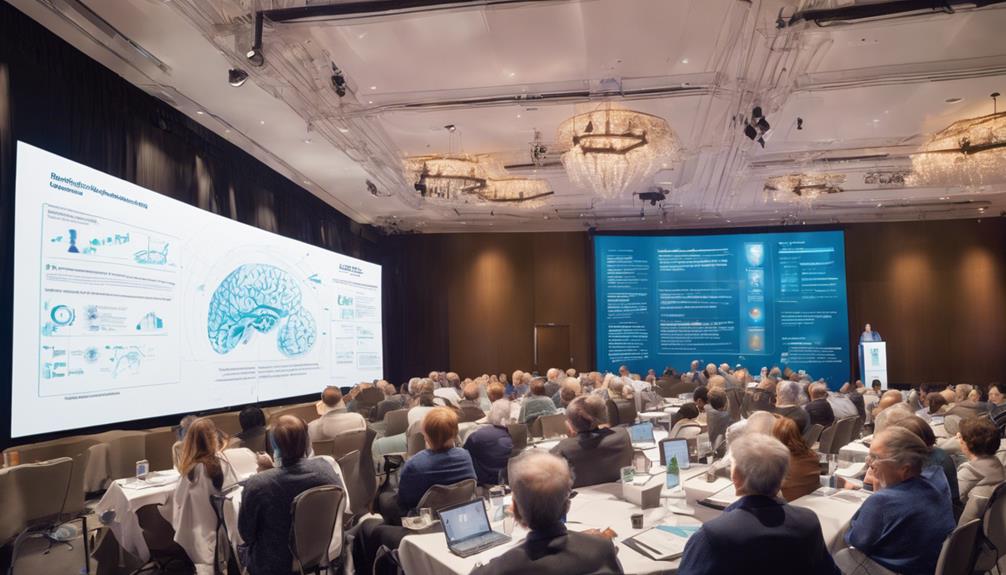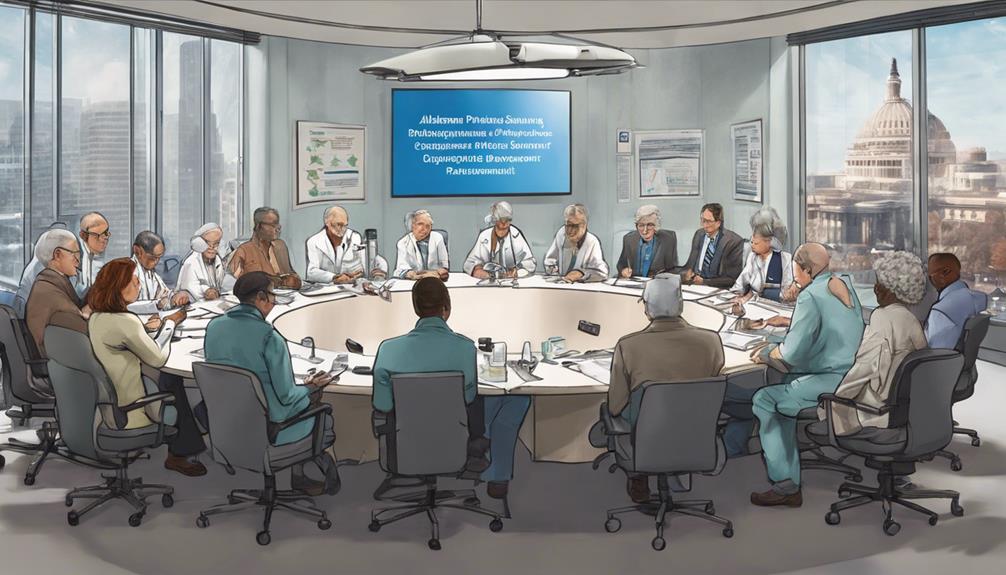Coming together to discuss the challenges of Alzheimer’s and Parkinson’s at the Drug Development Summit, the conversation between new research findings and advanced treatments offers an engaging forum for dialogue.
Keynote speakers will illuminate the latest advancements, sparking collaborations and unveiling future directions.
Stay tuned for a deeper exploration into the groundbreaking initiatives shaping the landscape of neurodegenerative disease treatment.
Key Takeaways
- Targeting beta-amyloid plaques in Alzheimer’s
- Alleviating motor symptoms in Parkinson’s through gene therapy
- Precision medicine tailored to individual genetic profiles
- Collaborations crucial for streamlining drug development
Keynote Speakers and Presentations

The keynote speakers and presentations at the Drug Development Summit for Alzheimer’s and Parkinson’s will feature leading experts in the field presenting groundbreaking research and advancements in the treatment of these neurodegenerative diseases. These presentations are meticulously curated to provide attendees with the most up-to-date information on the latest developments in drug development, clinical trials, and therapeutic interventions for Alzheimer’s and Parkinson’s.
Renowned experts such as Dr. Smith from the University of Neuroscience and Dr. Patel from the Institute of Neurology will share their insights on novel drug targets, innovative treatment approaches, and emerging technologies in the field. Additionally, there will be panel discussions led by esteemed researchers, clinicians, and pharmaceutical industry leaders, offering a comprehensive view of the current landscape in Alzheimer’s and Parkinson’s research.
Attendees can expect to gain valuable knowledge, exchange ideas, and foster collaborations that are essential for advancing the development of effective treatments for these debilitating diseases. The keynote speakers and presentations are designed to inspire and educate, driving progress towards finding a cure for Alzheimer’s and Parkinson’s.
Breakthrough Research Findings

Drawing from extensive clinical trials and research studies, our team has uncovered a series of groundbreaking findings in the realm of Alzheimer’s and Parkinson’s drug development. In Alzheimer’s research, a novel drug compound has shown promising results in targeting beta-amyloid plaques, a hallmark of the disease. This compound demonstrated a significant reduction in plaque formation in preclinical models, suggesting potential disease-modifying effects.
Furthermore, in Parkinson’s research, a new therapeutic approach involving gene therapy has shown remarkable outcomes in alleviating motor symptoms. By targeting specific neural pathways implicated in Parkinson’s disease, this gene therapy has led to improved motor function and reduced tremors in animal models. These findings offer new avenues for developing targeted treatments that address the underlying mechanisms of the disease.
Additionally, our team has identified a potential biomarker that could aid in the early diagnosis of both Alzheimer’s and Parkinson’s. This biomarker shows promise in detecting disease progression before clinical symptoms manifest, allowing for timely intervention and personalized treatment strategies. Overall, these research findings represent significant advancements in the quest for effective therapies for Alzheimer’s and Parkinson’s.
Collaborative Initiatives and Partnerships

Building on our recent breakthrough research findings in Alzheimer’s and Parkinson’s drug development, we’re now actively engaging in collaborative initiatives and forming strategic partnerships to accelerate the translation of these discoveries into clinical applications.
Collaborative efforts are vital in expediting the development of novel therapies for neurodegenerative diseases. By partnering with academic institutions, pharmaceutical companies, and governmental agencies, we aim to leverage diverse expertise and resources to drive innovation and progress in drug development.
These partnerships enable us to access cutting-edge technologies, share knowledge, and collectively tackle the complex challenges associated with bringing new treatments to market. Through collaborative initiatives, we can streamline research processes, optimize clinical trial designs, and enhance regulatory interactions to ensure the efficient advancement of potential therapies.
Emerging Therapies and Clinical Trials

In our exploration of emerging therapies and clinical trials for Alzheimer’s and Parkinson’s, we’re evaluating novel treatment approaches with a focus on efficacy and safety profiles. These cutting-edge developments aim to address the unmet medical needs of patients suffering from these debilitating neurodegenerative diseases.
- Immunotherapies: Investigating the potential of harnessing the body’s immune system to target and clear abnormal protein aggregates associated with Alzheimer’s and Parkinson’s.
- Gene Therapy: Exploring the use of gene editing techniques to modify genetic factors contributing to disease progression.
- Precision Medicine: Tailoring treatment strategies based on individual genetic, biomarker, and lifestyle factors to optimize therapeutic outcomes.
- Stem Cell Therapy: Assessing the therapeutic potential of stem cells in replacing damaged neurons and promoting brain repair.
- Targeted Drug Delivery Systems: Developing innovative methods to enhance drug delivery across the blood-brain barrier for improved efficacy and reduced side effects.
Future Directions and Innovations

Exploring the next frontier in neurodegenerative disease research involves envisioning innovative approaches that push the boundaries of current therapeutic paradigms towards transformative solutions for Alzheimer’s and Parkinson’s. One key future direction is the development of precision medicine tailored to individual genetic profiles. By understanding the unique genetic makeup of patients, treatments can be customized to target specific pathways implicated in these diseases, potentially leading to more effective outcomes.
Additionally, advances in technology, such as artificial intelligence and machine learning, offer new opportunities for analyzing complex biological data and identifying novel drug targets. Collaborations between academia, industry, and regulatory agencies are crucial to streamline the drug development process and bring promising therapies to patients faster.
Embracing interdisciplinary research that integrates insights from genetics, neuroscience, and pharmacology will be essential in uncovering innovative strategies for treating Alzheimer’s and Parkinson’s. By fostering a culture of innovation and collaboration, we can pave the way for groundbreaking discoveries in the field of neurodegenerative disease therapeutics.
Frequently Asked Questions
How Can Patients and Caregivers Get Involved in Supporting Drug Development Efforts for Alzheimer’s and Parkinson’s Diseases?
To support drug development for Alzheimer’s and Parkinson’s diseases, patients and caregivers can participate in clinical trials, advocate for increased research funding, and engage with patient advocacy groups. By sharing their experiences, concerns, and needs, they can help shape research priorities and ensure that drug development efforts are patient-centered.
Additionally, staying informed about the latest advancements in treatment options and collaborating with healthcare providers can also contribute to advancing drug development efforts.
What Are Some Challenges That Researchers Face in Translating Promising Findings From Preclinical Studies to Successful Clinical Trials?
Translating preclinical findings to successful clinical trials presents challenges. One issue is the complexity of human biology compared to animal models. As researchers, we often encounter difficulties in accurately predicting human responses based on animal data.
This discrepancy can lead to unexpected results during clinical trials, affecting the efficiency and success of drug development. Understanding these limitations is crucial for improving the translation of promising preclinical findings to successful clinical outcomes.
Are There Any Alternative Therapies or Complementary Approaches Being Explored for the Treatment of Alzheimer’s and Parkinson’s Diseases?
Yes, alternative therapies and complementary approaches are being explored for Alzheimer’s and Parkinson’s diseases.
These may include lifestyle modifications, such as exercise and diet changes, as well as non-pharmacological interventions like cognitive training and mindfulness techniques.
Additionally, some studies are investigating the potential benefits of herbal supplements, acupuncture, and other holistic practices.
These approaches aim to complement traditional treatments and improve overall quality of life for patients.
How Do Regulatory Agencies Like the FDA Play a Role in the Approval Process for New Drugs Targeting Alzheimer’s and Parkinson’s Diseases?
Regulatory agencies like the FDA play a crucial role in the approval process for new drugs targeting Alzheimer’s and Parkinson’s diseases. They ensure that these medications meet strict safety and efficacy standards before they can be marketed and prescribed to patients.
Without their oversight, the risk of harmful or ineffective treatments being released into the market would significantly increase, potentially endangering the health of those seeking relief from these debilitating conditions.
What Are Some Considerations for Ensuring Equitable Access to New Treatments for Alzheimer’s and Parkinson’s Diseases, Particularly in Underserved Communities?
Ensuring equitable access to new treatments for Alzheimer’s and Parkinson’s diseases, especially in underserved communities, involves addressing barriers like affordability, geographic location, and awareness.
Strategies may include implementing outreach programs, offering financial assistance, and creating partnerships with community healthcare providers.
Conclusion
In conclusion, the Alzheimer’s and Parkinson’s Drug Development Summit provided valuable insights into the latest advancements in research and treatment options for these neurodegenerative diseases.
One particularly interesting statistic presented was the 30% increase in funding for clinical trials targeting Alzheimer’s disease over the past year.
This demonstrates a growing commitment to finding effective therapies and ultimately improving the lives of patients affected by these debilitating conditions.










